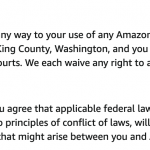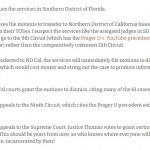
All of Trump’s Social Media Lawsuits Now Have Been Transferred to the Defendants’ Home Courts–Trump v. Facebook
In July, Trump sued Twitter, YouTube, and Facebook for terminating his accounts in three separate doomed-to-fail lawsuits. The lawsuits were filed in Trump’s home court of Southern District of Florida. The three defendants all filed motions to transfer the cases…

Another Online Account Termination Case Fails–King v. Facebook
The plaintiffs are Adrienne Sepaniak King and Christopher Edward Sepaniak King, a mother-son duo. The family that sues together stays together. Facebook terminated the mom’s account allegedly for violating Facebook’s community standards. Attempts to resurrect it were unsuccessful. The lawsuit…

Eighth Circuit Says a Browsewrap Might Form a Contract (and It Wasn’t Even a “Browsewrap”)–Foster v. Walmart
This is the latest dubious Internet Law ruling from the Eighth Circuit. (Other dubious rulings in 2021 include Select Comfort v. Baxter and Campbell v. Reisch). In this ruling, the court says Walmart may have imposed a binding arbitration clause…

Lawsuit Still Goes to Arbitration, Even Though Amazon Has Since Removed Its Arbitration Clause–Nicosia v. Amazon
This is the latest update in Nicosia’s multi-year lawsuit against Amazon. That lawsuit has already resulted in two Second Circuit opinions (and three blog posts). The district court found Nicosia was bound by the arbitration agreement in Amazon’s terms of…

Trump’s Must-Carry Lawsuit Against Twitter Moved to Twitter’s Home Court–Trump v. Twitter
As you recall, in July, Trump sued Twitter, Facebook, and YouTube for “deplatforming” him. As expected (see image to the right), YouTube successfully transferred its case to the Northern District of California. Now Twitter has done the same. (A reminder…

Peloton Can’t Bind All Family Members To Its Arbitration Provision–SS v. Peloton
This case involves the Peloton treadmill (“Tread+”). The treadmill has caused numerous personal injuries, and Peloton has recalled it. In this case, a 3 year old boy suffered personal injuries due to a Tread+ his dad bought. The dad, mom,…

If “Trespass to Chattels” Isn’t Limited to “Chattels,” Anarchy Ensues–Best Carpet Values v. Google
Trigger warning: this is a terrible opinion. Let’s hope the judge corrects his errors or that the appeals court does it for him. * * * This opinion addresses a venerable issue in Internet Law: can a website control how…

TOS Supports Injunction Against Web Scraping–Southwest Airlines v. Kiwi
This is a scraping lawsuit brought by Southwest airlines against Kiwi.com. The court issues an injunction restricting Kiwi from scraping Southwest’s website. Southwest does not allow online travel agencies to sell Southwest flights without the approval of Southwest. Its terms…

Trump Has to Litigate His Must-Carry Lawsuit in YouTube’s Home Court–Trump v. YouTube
In July, Trump et al sued Twitter, Facebook, and YouTube in Florida for terminating his accounts. At the time, I laid out a 6-step prediction for how things would go: We’ve reached Step 2 in the YouTube case. Based on…
When is it Fair Use to Use a Photo to “Illustrate” an Article?
One of the practices that has generated a sizeable number of disputes and rulings is the use of photos to illustrate articles. There is no shortage of articles being generated online, and often those content producers simply canvass the web…
